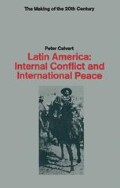Abstract
In 1900 there were twenty-one self-governing states in the Americas. By an odd fiction three of them, Canada, Newfoundland and the United States, all of them former British colonies, were (and are) regarded as being in some way different from the rest, which are collectively known in the English language under the generic term of ‘Latin America’. ‘Latin America’ is a purely artificial concept. The Latin Americans themselves do not often use the term.
Preview
Unable to display preview. Download preview PDF.
References
For a geography of Latin America see Preston E. James, Latin America, 2nd ed. (New York, Odyssey Press, 1950).
G. E. Marshall, ‘The Birth of the Mestizo in New Spain’, H.A.H.R. xix (May 1939) 161.
See in particular the valuable Donald M. Dozer, Latin America, an Interpretive History (New York, McGraw-Hill, 1962)
George Pendle, A History of Latin America (London, Penguin Books, 1964) is a good short introduction.
George C. Vaillant, The Aztecs of Mexico: Origin, Rise and Fall of the Aztec Nation (London, Penguin Books, 1950).
Sylvanus G. Morley, The Ancient Maya, 3rd ed. rev. (Stanford, Stanford University Press, 1956).
J. A. Mason, The Ancient Civilizations of Peru (London, Penguin Books, 1957).
Now old, but still of great literary merit are William Hickling Prescott, History of the Conquest of Mexico with a preliminary view of the ancient Mexican Civilisation and the life of the conqueror Hernando Cortez (London, Allen & Unwin, 1949) and History of the Conquest of Peru (London, Everyman’s Library, 1908).
Lewis H. Hanke, Aristotle and the American Indians; A Study in Race Prejudice in the Modern World (London, Hollis & Carter, 1959).
G. H. Haring, The Spanish Empire in America, rev. ed. (New York, Oxford University Press, 1952).
Lesley Byrd Simpson, The Encomienda in New Spain: the beginning of Spanish Mexico (Berkeley, University of California Press, 1966) pp. 210–11.
John Lynch, Spain under the Habsburgs, 2 vols (Oxford, Blackwell, 1964).
H. V. Livermore, A New History of Portugal (Cambridge, Cambridge University Press, 1966).
R. A. Humphreys, The Evolution of Modern Latin America (Oxford, Clarendon Press, 1946).
Wendell G. Schaeffer, ‘The Delayed Cession of Spanish Santo Domingo to France, 1795–1801’, H.A.H.R. xxix, 1 (February 1949) 46.
F.-P. Renaut, La question de la Louisiane, 1796–1806 (Paris, Édouard Champion, n.d.).
R. A. Humphreys, Liberation in South America, 1806–1827; the career of James Paroissien (London, Athlone Press, 1952).
Raymond Carr, Spain 1808–1939 (Oxford, Clarendon Press, 1966).
Ironically, one of the few easily accessible statements is Karl Marx in New Tork Daily Tribune, 24 November 1854, quoted in Karl Marx and Friedrich Engels, Revolution in Spain (London, Lawrence & Wishart, 1939).
Gerhard Masur, Simón Bolívar (Albuquerque, University of New Mexico Press, 1948).
H. G. Warren, Paraguay, An Informal History (Norman, University of Oklahoma Press, 1949) pp. 142–56.
John Street, Artígas and the Independence of Uruguay (Cambridge, Cambridge University Press, 1959).
Simon Collier, Ideas and Politics of Chilean Independence 1808–1833 (Cambridge, Cambridge University Press, 1967).
Oliveira Lima, O Movimento da Independência, O Imperio Brasiliero (1821–1889), 2nd ed. (São Paulo, Ediçoes Melhoramentos, 1928).
H. W. V. Temperley, The Foreign Policy of Canning, 1822–1827; England, the neo-holy alliance and the new world (London, Bell, 1925) p. 131–37
Dexter Perkins, A History of the Monroe Doctrine, rev. ed. (London, Longmans, 1960) gives the principal United States interpretation.
R. A. Humphreys, ‘Latin America, The Caudillo Tradition’, in Michael Howard, ed., Soldiers and Governments. Nine Studies in civil-military relations (London, Eyre & Spottiswoode, 1957) p. 151.
Luis Galdames, A history of Chile, trans, and ed. I. J. Cox (New York, Russell & Russell, 1964)
L. W. Bealer, ‘Juan Manuel de Rosas’, in A. Curtis Wilgus, ed., South American Dictators during the First Century of Independence (New York, Russell & Russell, 1963)
Otis A. Singletary, The Mexican War (Chicago, University of Chicago Press, 1960).
Clements R. Markham, The War between Peru and Chile, 1879–1882 (London, Sampson Low, Marston & Co., n.d.).
P. H. Box, The Origins of the Paraguayan War (Urbana, University of Illinois Press, 1929, Studies in the Social Sciences 15).
J. M. Henao and G. Arrubla, History of Colombia, trans, and ed. J. F. Rippy (Chapel Hill, University of North Carolina Press 1938) is the most complete account in English.
Franklin D. Parker The Central American Republics (London, Oxford University Press for Royal Institute of International Affairs, 1964).
Charles Allen Smart, Viva Juárez, a biography (London, Eyre & Spottiswoode, 1964)
Ralph Roeder, Juárez and his Mexico, 2 vols (New York, Viking Press, 1947).
Aníbal Pinto Santa Cruz, Chile, un caso de desarrollo frustrado (Santiago, Editorial Universitaria, 1962) pp. 14 ff.
Leland Hamilton Jenks, The Migration of British Capital to 1875 (New York, Knopf, 1927) pp. 44–9, 63.
Watt Stewart, Henry Meiggs, Yankee Pizarro (Durham, N.C., Duke University Press, 1946).
e.g. Arthur P. Whitaker, Argentina (Englewood Cliffs, N.J., Prentice-Hall, 1964)
George Pendle, Argentina, 2nd ed. (London, Oxford University Press for Royal Institute of International Affairs, 1961).
Frederick B. Pike, Chile and the United States, 1880–1962; the emergence of Chile’s social crisis and the challenge to United States diplomacy (Notre Dame, University of Notre Dame Press, 1963) pp. 34–8, cf. pp. 81–5.
Stephen Clissold, Latin America, A cultural outline (London, Hutchinson University Library, 1965).
Copyright information
© 1969 Peter Calvert
About this chapter
Cite this chapter
Calvert, P. (1969). The New Century. In: Latin America: Internal Conflict and International Peace. The Making of the Twentieth Century. Palgrave, London. https://doi.org/10.1007/978-1-349-15305-3_1
Download citation
DOI: https://doi.org/10.1007/978-1-349-15305-3_1
Publisher Name: Palgrave, London
Print ISBN: 978-0-333-07492-3
Online ISBN: 978-1-349-15305-3
eBook Packages: Palgrave History CollectionHistory (R0)

